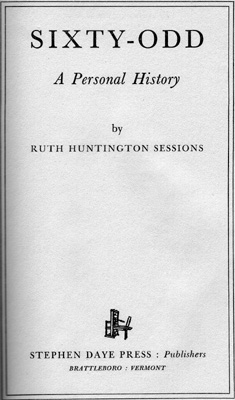Ruth Huntington Sessions' Reflections on the Third Women's Congress
Ruth Gregson Huntington Sessions was born on November 3, 1859, the sixth birth, but fourth surviving child of Frederic Dan Huntington and Hannah Dane Sargent. Like her older brother and sister, James and Arria, Ruth was also drawn to social justice causes until her death in 1946. Ruth’s lifetime covered the end of the Civil War and emancipation, women’s suffrage, and other Progressive Era Reform movements. Her sister, Arria, was elected to the New York State Board of Education before women in the United States had the right to vote. Her brother James, founded the Monastic Order of the Holy Cross on the Lower East Side of Manhattan and was involved with the Knights of Labor and with other radicals. Ruth’s 1936 memoir which she wrote at 72 years old, Sixty Odd, reflects on her childhood summers at “Forty Acres,” family, coming of age, and her rising consciousness.
When Ruth was sixteen years old, the Third Congress of the Association for the Advancement of Women was held in Syracuse New York. The Association for the Advancement of Women was founded in 1873. Their mission according to their constitution was, "to receive and present practical methods for securing to Women higher intellectual, moral, and physical conditions."[1] Among guests that year was Louisa May Alcott, author of Little Women. Ruth reflects on Alcott’s presence in Syracuse for the conference when she stayed with the Mills family, who were friends of Ruth’s, “To see its [Little Women’s] author in person and hear her talk was a prospect which enlisted feminine interest, old and young, in the Congress itself.”[2] Ruth attended the Congress on its opening day. She notes seeing Mary A Livermore, Maria Mitchell, and Elizabeth Cady Stanton there. Maria Mitchell, one of the cofounders of the group, served as its president from 1875-1876, when the congress came to Syracuse. Mitchell was also the first woman to be a professional astronomer in the United States and taught at Vassar College.[3] Mary A Livermore, who Ruth notes as a friend of her mother’s, was an outspoken activist for the end of enslavement, women’s suffrage, and other Progressive-Era reform movements.[4] Livermore was a writer and involved with many groups, serving as the president of the Association for the Advancement of Women in 1873.[5] Despite Ruth’s awareness of these women and close proximity to the conference, she admits that at sixteen years old, she was ignorant of the growing women’s rights movement and as she puts it, “of the heroism which characterized those early days of woman's struggle for independence.”[6] Ruth remembers, as was typical for the time, believing “that the destiny of woman was to rule over a domestic kingdom as queen and mistress; man's guiding star, a beneficent influence, a wise mother, a gifted teacher or writer or musician if possible, but at least, failing more striking attainments, a contented housewife.”[7] Ruth does not credit her parents the beliefs she held surrounding women’s roles.[8]
The speeches delivered at the Third Women’s Congress turned Ruth “head over heels, for the Cause of Woman,” with big hopes and dreams for her future inspired by women like Mary A Livermore.[9] Ruth later became a writer, a founding member of the Consumer’s League, an outspoken proponent for women’s rights, and a house mother at Smith College, where today, Sessions House still stands in honor of her.
You can read more about Ruth Huntington Sessions on our website and on the finding aid for the Porter-Phelps-Huntington Family Papers at Amherst College. And as always, we recommend touring the Porter-Phelps-Huntington Museum to learn more about the six generations of the family.
Sources
[1] “Maria Mitchell and Women’s Rights,” Vassar Encyclopedia, accessed July 16, 2019, http://vcencyclopedia.vassar.edu/faculty/original-faculty/maria-mitchell/maria-mitchell-and-womens-rights.html.
[2] Ruth Huntington Sessions, Sixty Odd: A Personal History, (Brattleboro: Stephen Daye Press: 1936), 99.
[3]Britannica Academic, s.v. "Maria Mitchell," accessed July 16, 2019, https://academic-eb-com.libproxy.smith.edu/levels/collegiate/article/Maria-Mitchell/53020.
[4] Britannica Academic, s.v. “Mary Ashton Rive Livermore,” accessed July 16, 2019, https://academic-eb-com.libproxy.smith.edu/levels/collegiate/article/Mary-Ashton-Rice-Livermore/125840#.
[5]Britannica Academic, s.v. “Mary Ashton Rive Livermore,” accessed July 16, 2019, https://academic-eb-com.libproxy.smith.edu/levels/collegiate/article/Mary-Ashton-Rice-Livermore/125840#.
[6] Ruth Huntington Sessions, Sixty Odd: A Personal History, (Brattleboro: Stephen Daye Press: 1936), 99.
[7] Huntington Sessions, Sixty Odd, 99.
[8] Huntington Sessions, Sixty Odd, 99.
[9] Huntington Sessions, Sixty Odd, 104.
Association for the Advancement of Women. Souvenir Nineteenth Annual Congress of the Association for the Advancement of Women Invited & Entertained by the Ladies’ Literary Club. 1877. 128. https://books.google.com/books?id=Z-4EAAAAMAAJ&source=gbs_navlinks_s.
Porter-Phelps-Huntington Family Papers, on deposit at Amherst College Archives and Special Collections, Amherst College Library.

